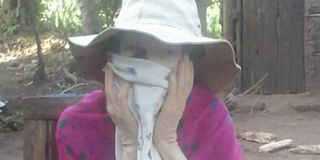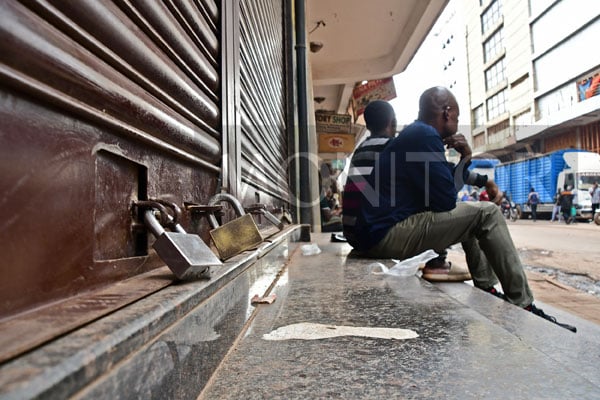Woman battles skin cancer for 15 years

Ms Alaisa Naibira says she only feeds on eggs and milk, which are expensive yet she can nolonger dig to support her family. PHOTO BY TAUSI NAKATO
KAMULI- When you hear Ms Alaisa Naibira, who is living with albinism, speak on phone, she sounds like a person suffering from flu or sinuses.
But this is not the case. The 52-year-old widow and a mother of six has been battling skin cancer for 15 years.
When Daily Monitor recently visited her home in Bugondha Village, Mbulamuti Sub-county in Kamuli District, her mouth, nose, and left part of her face was been eaten up.
With a round cap on her head, a shawl hanging on her shoulders and a white piece of cloth covering part of the face, Ms Naibira speaks with pain.
Albinism is a range of disorders caused by a reduction or absence of the pigment melanin, often causing white skin, light hair, and vision problems.
The condition affects an estimated one in 17,000 people globally.
“It was in 2002 when I was about to reach home that is when a speeding vehicle knocked me and I developed minor injuries under my nose and in the back. I was admitted at Jinja Regional Referral Hospital for four days but despite getting treatment, the injuries spread to the lower part on the nose,” says Ms Naibira.
“In 2003, I returned to the hospital after feeling more pain and developing a lump under my upper lip. I was operated on and the lump removed,” she adds.
Ms Naibira recollects of how the pain persisted and that when she returned to the hospital, doctors warned her that she was likely to suffer from skin cancer.
In 2010, when she re-visited the same doctors after her situation worsened, they advised her to visit Nyenga Hospital, which also referred her to Mulago National Referral Hospital.
Diagnosis
Her trip to Mulago that year confirmed her fear; doctors diagnosed her with basal cell carcinoma, a cancer that grows on sections of a skin due to exposure to a lot of sunshine.
“The cancer had also started eating up my nose and the lower lip, prompting the doctors at Mulago to ask me to allow that my skin around the thighs be cut to cover up the affected part (wide excision) so that they can do skin drafting,” Ms Naibira recollects.
She continues: “I refused because they asked for Shs5m for the operation, which I didn’t have at that time. Secondly, I was tired of operations because that was to be the fourth one, and thirdly, I had feared that doctors could connive with traditional healers to sell off some of my body parts during the operation because they are reportedly marketable.’’
Between 2011 and 2012, she says a group of people from America treated her twice at Danida Village, Walukuba Division in Jinja and that the wounds seemed to have improved.
“From 2014 to date, the cancer has continued eating up my face. Hospice Uganda is now giving me drugs every two weeks. They (drugs) don’t cure but prevent the wound from smelling. They also give me pain killers and drugs to help me sleep,” she adds.
Feeding
Ms Naibira says she only feeds on eggs and drinks.
“The situation is bad. The cancer raptured most of my face that I can’t eat properly. I can only eat eggs, porridge and milk yet they are very expensive and sometimes I can’t afford,” she adds.
Ms Naibira, who is being taken care of by her 24-year-old daughter, Hajira Nazerena, says she is financially incapacitated because she can’t dig as frequently as she used to.
She adds that she has sold almost everything that she owned to access treatment.
Naibira’s condition
Dr Dean Ahimbisibwe, a general practitioner, who retired from Jinja Regional Referral Hospital, explains that Ms Naibira’s condition (carcinoma) is likely to eat her whole face and head.
He adds that if it was Malignant Carcinoma, it would have already spread to other parts of the body because it spreads so fast and that if she had accepted the wide excision at Mulago, she would have been okay because hers is benign carcinoma.
“Naibira is in her late stage of skin cancer and even if they cut a piece of her flesh, it will not respond because cancer has already eaten the skin and muscles,’’ Dr Ahimbisibwe says.
He says many persons with albinism die of skin cancer because they lack the enzyme that produces melanin, a substance that gives skin, hair, and eyes their colour.
The chairperson of the Source of the Nile Union of Persons with Albinism, Mr Peter Ogik, says 80 per cent of people living with the condition die of skin cancer.
“The number of young ones dying are more than the aging ones because most of them die before 50 years of age and since December last year, eight have died of skin cancer in Busoga sub-region,” he says.
Mr Ogik adds that the association has a membership of 500 albinos, half of whom suffer from skin cancer.
He also says many albinos cannot afford sunscreen cream, which helps in preventing skin cancer.
Mr Ogik says they are currently focusing on early prevention.
Hoping for better
Meanwhile, Ms Naibira says she has hope of being declared cancer-free if someone gets her the right drugs that can dry her wounds.
“Allah is with me. I will survive. I don’t care whether my face remains as it is. The only worry is that it has refused to dry but I am not the only one with such a problem. Even those with cleft mouths exist. Currently, the pain is too much and is threatening my life. Sometime, I suffer from flu and cough and I struggle with such diseases in this condition,” she states.




